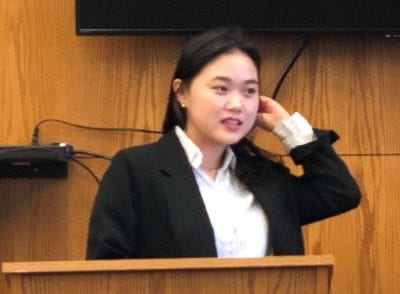Fulbright Language Festival Celebrates Student Accomplishment

Myeongju Ahn, a visiting student from South Korea, delivers a winning speech in the English Language and Culture program’s section of the Fulbright Language Festival. She also received a prize for her performance in Japanese.
While the weather may not be indicative, spring has sprung all over campus. One culminating highlight took place on Thursday, April 19, 2018 as students from five departments demonstrated their achievement and prowess at the Fulbright Foreign Language Festival.
Initially launched in 2002, the festival honors and celebrates the efforts of students in foreign languages with a speech contest and cultural performances. According to Tatsuya Fukushima, “The biggest benefit in hosting the Fulbright Language Festival is it has helped increase the visibility of less commonly taught languages. In Arabic, for example, the contest grew bigger under the current leadership and now includes four divisions, and its students have been incorporating creative ideas in its cultural performances.”
In addition to Arabic, students competed against one another in multiple divisions in Japanese, Chinese, Russian and English as a Second Language. Speeches were delivered by students and judged by experts of each language. Fukushima went on to comment that “For Japanese, we are grateful to have strong support from the Consulate-General of Japan in Nashville, Tennessee. The Consulate-General’s office has been sending its officer as a judge to the Japanese contest for most of the 17 years, and the Japanese program wouldn’t have reached the level it did without the Consulate-General’s generous support.”
In some cases, students participated both as competitors and judges. Ekaterina Konstantinova, an exchange student from Russia who took first runner-up prize in the English Language and Culture program’s advanced division, discussed this perspective. “I got a really unique experience being both one of the judges for the Russian speech contest and a contestant in English. Being on both sides gave me a perspective on how to judge objectively and what mistakes I should avoid as a contestant.”
The cultural performances that preceded the awards ceremony included a Japanese song and dance, a poem and song in Russian, an Arabic song and dance, and a humorous poem in Chinese complete with “subtitles” in English and Chinese.
This story originally appeared in the University of Arkansas’ Newswire publication. Please visit news.uark.edu for more stories like this.
Tatsuya Fukushima
Associate Professor of Japanese, World Languages, Literatures and Cultures
479-575-5535 // tatsuya@uark.edu

